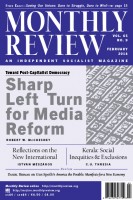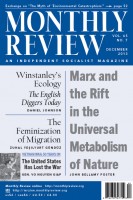
Monthly Review Volume 65, Number 9 (February 2014)
A comparison of the present state of the natural sciences with that of the social (or human) sciences cannot but give rise to a disquieting sense of the relative poverty of the latter. Although natural scientists are raising the alarm with regard to the planetary environmental emergency and are demanding social solutions, social scientists have largely failed to take up the challenge. To be sure, there has been a vast upsurge in recent years of social-scientific discussions of climate change. But most of this work has remained confined within the narrow boundaries of mainstream social science, relying on such amorphous, dehistoricized concepts as human behavior, organizations, institutions, government, economic growth, industrialization, modernization, the market, energy efficiency, public opinion, and the like—variables that can be treated in purely technical, “non-normative” terms, divorced from historical context, social relations, and social agency.… Conspicuously missing from conventional social science is any serious consideration of the actual social system in which we live and which clearly constitutes the root of the problem: namely, capitalism. Also excluded are such fundamental issues as accumulation, class (including its gendered and racialized forms), the state, the cultural apparatus, imperialism, monopolistic corporations, economic stagnation, financialization, Marx’s concept of the metabolic rift—and indeed all the other major historical realities of our time.… | more |
Sharp Left Turn for the Media Reform Movement
Toward a Post-Capitalist Democracy
The contemporary media reform movement exploded into prominence in the United States in 2003 as a response to the effort by the Bush Federal Communications Commission (FCC) to weaken media ownership regulations.… The size and success of this popular uprising was…a testament to the power of activism to thwart the plans of the powerful in seemingly hopeless conditions.… The Obama campaign in 2007 and 2008 expressed interest in media reform and worked closely with members of the movement…. Except for Obama’s speech against the Iraq War invasion, it was arguably his communication platform that most distinguished him as a progressive in the 2008 presidential primaries.… One can debate whether this was an appropriate strategic shift at the time but there can be no debate that the strategy failed. The Obama administration abandoned its platform almost immediately, and repudiated the movement.… | more |
Dare to Struggle, Dare to Win?
Any review of the recent ups and downs of U.S. labor must start in Michigan, long a bastion of blue-collar unionism rooted in car manufacturing. Fifteen months ago, this Midwestern industrial state became another notch in the belt of the National Right to Work Committee, joining the not-very-desirable company of Texas, Oklahoma, Alabama, and twenty other “open shop” states.… The emergence of sun-belt labor relations in the birthplace of the United Auto Workers (UAW) was shocking to some. But this political setback was preceded by high-profile defeats in neighboring states that began in 2005. First Indiana, followed by Wisconsin and Ohio, stripped public workers of their bargaining rights (although the Republican attack on government employees was later repelled by popular referendum in the Buckeye State). Then in early 2012, GOP legislators in Indiana passed a right-to-work law applicable to private industry.… | more |
Social Inequities and Exclusions in Kerala’s ‘Egalitarian’ Development
Social inequalities and exclusions can devastate people’s lives, especially when they are far from the centers of power and control. This wreckage can be seen in many different parts of their lives, but particularly in their health. The health of any given country’s population is primarily determined by politics, and public policies play a critical role. All over the world, countries with a history of egalitarian ideologies, and corresponding policies aimed at reducing social inequalities, have healthier populations. The Indian state of Kerala, which has a long-running radical political tradition and a history of social-reform movements in the early twentieth century, is acclaimed for its achievements in health and social-sector development, including low levels of mortality and fertility, and high levels of life expectancy and literacy—all despite its low-performing economy. Kerala has become a veritable mecca for other low-income nations in social development and health advancement.… | more |
Reflections on the New International
Dedicated to the Memory and Legacy of President Hugo Chávez
The need for the establishment and successful operation of The New International is painfully obvious and urgent today. The enemies of a historically sustainable societal reproductive order, who occupy at the present time still the dominant position in our increasingly endangered world, do not hesitate for a moment to exploit in the interest of their destructive design, with utmost cynicism and hypocrisy, the existing decision-making and opinion-forming organs of the international community, from the Security Council of the United Nations to the great multiplicity of the national and international press and to the other mass media under their direct material stranglehold.… At the same time the adherents of the much needed socialist alternative are fragmented and divided among themselves, instead of internationally combining their strength for the cause of a successful confrontation with their adversaries.… | more |
Three Cheers (Almost) for Gus Speth
The phrase “you’ve come a long way, Gus” kept bouncing around in my head as I read Gus Speth’s surprising new book America the Possible (Manifesto for a New Economy). The man whom Time called the “ultimate insider” tells how he was arrested in front of the White House in August 2012 and spent a couple days in the District of Columbia jail for protesting the Keystone XL pipeline.… There is little that is completely new in America the Possible for long-term Monthly Review readers, but Speth’s breathtaking admission of the futility of expecting change from working inside the establishment is totally believable. Who, after all, could be better qualified to say “Been there, done that?” What is the most useful in Speth’s book is the detailed catalogue of specific proposals which, if implemented, would revolutionize (not Speth’s word) U.S. society from top to bottom.… | more |

Monthly Review Volume 65, Number 8 (January 2014)
On November 16, 2013, Paul Krugman published a piece on his New York Times blog entitled “Secular Stagnation, Coalmines, Bubbles, and Larry Summers,” consisting of an extended commentary on former Clinton Treasury Secretary and Obama economic advisor Lawrence Summers’s November 8 presentation to the IMF’s Economic Forum.… Krugman, in following up on Summers’s IMF speech, highlighted Alvin Hansen’s theory of secular stagnation in the 1930s to ‘50s.… [acknowledging that] long-term economic stagnation…was now “the norm” for the economy, not the exception.… Writing in a fashion that could have come straight out of Monthly Review at any point in the last forty years, he declared: “We now know that the economic expansion of 2003–2007 was driven by a bubble. You can say the same about the later part of the 90s expansion; and you can in fact say the same about the later years of the Reagan expansion, which was driven at that point by runaway thrift institutions and a large bubble in commercial real estate.” But in trying to understand how stagnation itself came about and created this whole irrational set of economic conditions, Krugman…failed to draw attention to the much more important problem of investment under conditions of overcapacity and mature industry, as well as the whole question of monopolistic/oligopolistic capitalism—all of which were taken seriously at some level by Hansen, and were developed in a far more radical way by socialist thinkers such as Michał Kalecki, Joseph Steindl, Paul Baran, and Paul Sweezy.… | more |
The Plight of the U.S. Working Class
Modern capitalism, sociologist Max Weber famously observed early in the twentieth century, is based on “the rational capitalistic organization of (formally) free labor.” But the “rationality” of the system in this sphere, as Weber was to acknowledge elsewhere, was so restrictive as to be in reality “irrational.” Despite its formal freedom, labor under capitalism was substantively unfree.… This was in accordance with the argument advanced in Karl Marx’s Capital. Since the vast majority of individuals in the capitalist system are divorced from the means of production they have no other way to survive but to sell their labor power to those who own these means, that is, the capitalist class.… The result is a strong tendency to the polarization of income and wealth in society. The more the social productivity of labor grows the more it serves to promote the wealth and power of private capital, while at the same time increasing the relative poverty and economic dependency of the workers.… | more |
The Labor Share Question in China
In the past two decades, China’s economic growth has been increasingly dependent on investment. To maintain the growth of investment, China must sustain a fairly high rate of profit, and the fall in labor’s share has been seen as a crucial factor to sustain profitability.… Although the mainstream economists have widely admitted there is a downward trend for labor’s share in China, they explain this trend with a story that has nothing to do with class struggle. In this story, the decline of labor’s share is caused by sectoral changes, mainly the decrease of agriculture and the increase of industry and services as a percent of GDP in the reform era…. [But] Does the decline of labor’s share result from sectoral changes?… [In fact] the decline of labor’s share resulted from the loss in the power of the working class during the transition to capitalism. Sectoral changes have disguised the class conflicts in this historical process.… | more |
Political and Ideological Crisis in an Increasingly More Authoritarian European Union
Acute economic and political drama mark contemporary Europe. The terrible trauma of the financial crisis has been followed by a sovereign-debt disaster. In the countries most deeply affected, the people have been faced with massive attacks on public services, wages, pensions, trade unions, and social rights. The draconian austerity policies have pushed the situation in those countries from bad to worse, leading them into a deep depression.… Confronted with these multiple crises, the traditional labor movements appear perplexed and partly paralyzed. Social democracy is in political and ideological disarray and confusion, reflecting a deep crisis in these movements. On the one hand, social democrats have played a leading role in fierce attacks on trade unions and the welfare state in countries where they have been in power. On the other hand, other social democrats adopt statements and support appeals that sharply condemn the political course now followed by the European Union.… | more |
Who has little, let them have less
Marge Piercy is the author of eighteen poetry books, most recently The Hunger Moon: New & Selected Poems, 1980–2010 from Knopf. Her most recent novel is Sex Wars (Harper Perennial) and PM Press has republished Vida and Dance the Eagle to Sleep with new introductions.… | more |
Former UN Secretary General Boutros Boutros-Ghali sets the tone in his introduction to The Poorer Nations, arguing that the moment has arrived for scholars from the underdeveloped world of plundered resources and impoverished people to make the necessary statements themselves, rather than leaving that work to the first world left. Boutros-Ghali makes one other important point: that Prashad is hard at work rediscovering the hopes of earlier decades, the moment of anti-colonialist hopes, of common feeling among various nationalities and nations freeing themselves and looking forward to a kind of communitarian developmental process that was, often enough, called “socialism.”… | more |

Monthly Review Volume 65, Number 7 (December 2013)
The AFL-CIO held its annual convention this past September in Los Angeles. Many commentators hailed this meeting as historic, one in which the nation’s major labor federation finally came to grips with the near disappearance and growing political irrelevance of unions. Union density is abysmally low and declining, with an astonishing 6.6 percent of private sector employees now organized, lower than at any time in the past century. And, with rare exceptions, labor’s ability to influence legislation and workplace regulation is nonexistent. It could not even prevent passage last year of a right-to-work law in Michigan, the cradle of industrial unionism. All of this has translated into falling wages and benefits for union and nonunion workers alike, since the union threat effect on nonunion employers has diminished dramatically.… To reverse course, AFL-CIO leaders laid out a plan to broaden the federation’s membership base to include nonunion workers and members of fraternal groups, such as immigrant advocates and environmental organizations.… While we should applaud… [their] efforts, they leave important questions unanswered.… | more |
Marx and the Rift in the Universal Metabolism of Nature
The rediscovery over the last decade and a half of Marx’s theory of metabolic rift has come to be seen by many on the left as offering a powerful critique of the relation between nature and contemporary capitalist society. The result has been the development of a more unified ecological world view transcending the divisions between natural and social science, and allowing us to perceive the concrete ways in which the contradictions of capital accumulation are generating ecological crises and catastrophes.… Yet, this recovery of Marx’s ecological argument has given rise to further questions and criticisms.… | more |
The English Diggers Today
Beginning in 2011 a festival in honor of the seventeenth-century radical Gerrard Winstanley has been held annually…commemorate[ing] the life and ideas of…Winstanley, leader of the Digger, or True Leveller, movement of the English Revolution (1640–1660). Largely forgotten for much of the eighteenth and nineteenth century, the communist thought of Winstanley was rediscovered by German and Russian Marxists in the late nineteenth century… From the socialists of the late nineteenth century to participants in the Wigan Festival in the early 2000s, Winstanley and the Diggers have provided inspiration for radical leftists for more than a hundred years.… What accounts for the lasting popularity of a relatively marginal social movement and its main theorist in the middle of seventeenth-century England? More importantly for present purposes, why have Winstanley and the Diggers held a prominent place for modern activists concerned with environmental issues and consumerism?… | more |
Care and the New Emotional Imperialism
The astonishingly high number of women migrating is a new global trend. In the past it was mainly men who went to countries far away; women came as followers. In the last twenty years, however, this has changed so much that today over half of all migrants are women. Furthermore, female migrants have often become the main or single wage earners of their families. Saskia Sassen calls this the “feminization of survival”—societies, governments, and states more and more depend on the work of women in the labor force. Thus the necessary conditions of work and survival fall increasingly on the shoulders of low-waged, deprived, and exploited migrant women.… | more |
The United States Has Lost the War
An Interview
Reply to “The Myth of ‘Environmental Catastrophism’”
Ian Angus constructs a strawperson in his article “The Myth of ‘Environmental Catastrophism’” (MR, September 2013), which discusses Catastrophism: The Apocalyptic Politics of Collapse and Rebirth, which consists of essays by myself, as well as Sasha Lilley, David McNally, and James Davis. The book is concerned with the political uses of catastrophe and whether actual catastrophes or catastrophic rhetoric can spur people to action. At the heart of Catastrophism is the question of politicization. My essay, which Angus primarily focuses upon, looks at the indisputably catastrophic and urgent devastation of the environment…and asks why environmental movements in the global North have not been effective at moving people to action by simply evoking the calamity of the situation.… | more |
Noting the global rise in urban social movements from Occupy Wall Street to the Arab Spring that are challenging the present global order, David Harvey asks in his new book Rebel Cities: “Is there an urban alternative and, if so, from where might it come?” In answering these questions Harvey explores the critical role of the city in the reproduction of capital and birth of radical social movements. He argues that many theorists and activists interested in broad-based social change have largely overlooked cities, despite the historical and growing importance of metropolitan centers in all aspects of human affairs.… | more |
[Zak] Cope argues that the seemingly pervasive racism and cultural chauvinism in the global North is not the result of false consciousness, misinformation, indoctrination, or ignorance (at least to the extent that much of the political left assumes). Rather, racism and cultural chauvinism are the expression of economic interests shared by a variety of social strata in the global North, all of whom have an interest in exploiting the global South. Central to this argument is the idea that the labor aristocracy—the relatively privileged global North working class—developed as a result of the exploitation of the global South, and therefore has a material interest in continuing this exploitation.… | more |








































